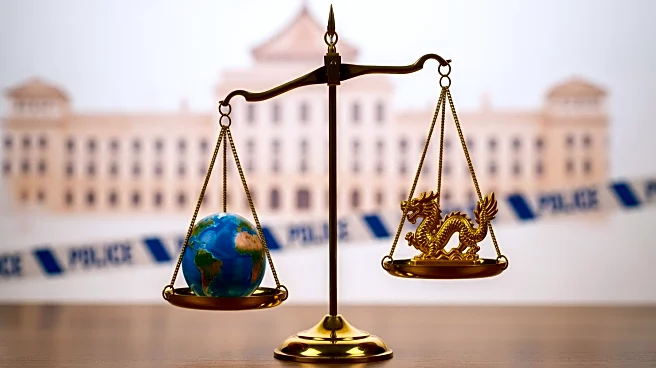What's Happening?
China has responded to criticism from Ukrainian President Volodymyr Zelensky regarding its support for Russia amid the ongoing conflict in Ukraine. Zelensky accused China of aiding Russia's war efforts,
stating that China is not interested in Ukraine's victory. China, however, maintains its stance of neutrality, emphasizing its promotion of ceasefire and peace talks. Despite China's claims of neutrality, Western nations have highlighted the flow of dual-use goods from China to Russia, which could bolster Russia's military capabilities. Additionally, China has become a crucial economic partner for Russia, with increased bilateral trade and significant purchases of oil and gas. NATO leaders have expressed concern over China's role, labeling it a decisive enabler of Russia's war against Ukraine.
Why It's Important?
The involvement of China in the Russia-Ukraine conflict has significant implications for global security and economic dynamics. China's support for Russia, whether direct or indirect, poses a threat to Euro-Atlantic security, as noted by NATO leaders. The economic ties between China and Russia, particularly in energy trade, undermine international sanctions aimed at isolating Russia. This situation complicates diplomatic efforts to resolve the conflict and may lead to further geopolitical tensions. The EU's decision to sanction Chinese companies involved in enabling Russia's revenue streams reflects the growing concern over China's role in the conflict. These developments could lead to strained relations between China and Western nations, impacting global trade and diplomatic relations.
What's Next?
In response to the EU's sanctions on Chinese oil refiners, China's Commerce Ministry has warned of taking resolute steps to protect its companies' interests. This could lead to retaliatory measures from China, further escalating tensions between China and Western countries. The ongoing criticism from Ukraine and Western nations may pressure China to reassess its position and involvement in the conflict. Diplomatic efforts may intensify to encourage China to play a more constructive role in resolving the crisis. The international community will likely continue to monitor China's actions closely, as its decisions could significantly influence the trajectory of the Russia-Ukraine conflict.
Beyond the Headlines
China's involvement in the Russia-Ukraine conflict raises ethical questions about neutrality and the responsibility of global powers in conflict resolution. The situation highlights the complexities of international relations, where economic interests often intersect with geopolitical strategies. China's actions may set a precedent for how major powers engage in conflicts indirectly, through economic and military support. The long-term implications could include shifts in alliances and the balance of power in global politics, as countries reassess their diplomatic and economic strategies in response to China's role.









